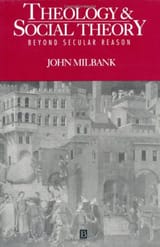Search Results
7/5/2025, 2:04:36 AM
Pic related is a really great, much deeper expansion on what Deneen is talking about from the lens of philosophy. I'd also highly recommend Charles Taylor's A Secular Age on this same topic. Actually, Taylor is more accessible and doesn't presuppose a lot of knowledge of philosophy. If you're not Christian, he will also be a bit more appealing.
Others have written on this quite well too, D.C. Schindler, David Bentley Hart, etc. Together I think they offer an extremely strong positive alternative to liberalism and post-modernism, whereas post-modern theorists only offer up critique (granted, some of it is quite good). Yet their core insights re politics don't require Christian revelation. They draw on themes that are in Pagan classical thought, Islamic and Jewish thought, Indian and Chinese thought—the only thing they really seek to transcend (and certainly not while rejecting everything) is Enlightenment "secularism."
I think this is ultimately the only way to reach a real post-modernity, and not the ersatz post-modernity we have, which is really just hyper modernity, a new Reformation, this time against Enlightenment reason and liberalism. What is needed instead is the recovery of the classic, and to pair away what is deficient in the modern, namely a sort of overweening pride that absolutizes human reason as a "system" and makes freedom a sort of sheer volanturist movement towards arbitrary desire. That is, the recovery of a sense of man's telos, his rational appetites for Goodness, Beauty, and Truth, and the dictum that epithumia and thymos must be ordered to a higher logos, one that brings us beyond the limits set by current belief and desire.
Others have written on this quite well too, D.C. Schindler, David Bentley Hart, etc. Together I think they offer an extremely strong positive alternative to liberalism and post-modernism, whereas post-modern theorists only offer up critique (granted, some of it is quite good). Yet their core insights re politics don't require Christian revelation. They draw on themes that are in Pagan classical thought, Islamic and Jewish thought, Indian and Chinese thought—the only thing they really seek to transcend (and certainly not while rejecting everything) is Enlightenment "secularism."
I think this is ultimately the only way to reach a real post-modernity, and not the ersatz post-modernity we have, which is really just hyper modernity, a new Reformation, this time against Enlightenment reason and liberalism. What is needed instead is the recovery of the classic, and to pair away what is deficient in the modern, namely a sort of overweening pride that absolutizes human reason as a "system" and makes freedom a sort of sheer volanturist movement towards arbitrary desire. That is, the recovery of a sense of man's telos, his rational appetites for Goodness, Beauty, and Truth, and the dictum that epithumia and thymos must be ordered to a higher logos, one that brings us beyond the limits set by current belief and desire.
7/3/2025, 8:24:53 PM
Are there post-modern (or liberal/analytic) responses the this, or similar analyses by guys like David Bentley Hart and D.C. Schindler?
I started with post-modernism and sort of worked my way back. These are tightly argued and not the sort of throwaway attacks you see by propagandists in the culture war. I have not come across any POMO responses to this sort of critique though, only to the propagandists and to a lesser extent the analytics. Or is religious philosophy considered safely ignorable because it is religious?
It seems to me that the most serious charge here is that many of the POMOs do poor history of philosophy, and this is also where the traditionalists have a strong claim to expertise. That seems highly relevant though, since dismissals of all past thought are often a sort of grounding, starting point.
I started with post-modernism and sort of worked my way back. These are tightly argued and not the sort of throwaway attacks you see by propagandists in the culture war. I have not come across any POMO responses to this sort of critique though, only to the propagandists and to a lesser extent the analytics. Or is religious philosophy considered safely ignorable because it is religious?
It seems to me that the most serious charge here is that many of the POMOs do poor history of philosophy, and this is also where the traditionalists have a strong claim to expertise. That seems highly relevant though, since dismissals of all past thought are often a sort of grounding, starting point.
Page 1
